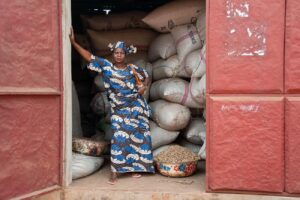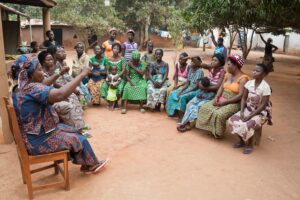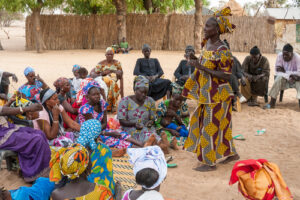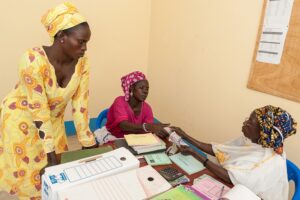Microfinance program as part of the epicenter strategy
The microfinance program is a training, savings and credit program that supports the economic empowerment of women in Africa
Factsheet: Microfinance Program
Microfinance program
The Hunger Project’s microfinance program is managed by women and primarily helps women. It is a training, credit and savings program through which microcredits are distributed to groups of women and men and a savings culture is promoted.
The program acquires the financial means for economic independence and an official state certification to operate as a village bank. Small loans are primarily used for farm work and retail trade to successfully increase household income. With the microfinance program, women gain a strong voice in the community.
The core elements of the microfinance program are training, credit and savings programs: Microfinance training, income-generating workshops, loans and savings.

Microfinance training
Microfinance training strengthens people in literacy, budgeting, credit management, leadership, accounting and business plan development. Since the Hunger Project primarily provides loans to small groups that commit to each other to remain solvent in order to repay debts, they are also trained in group dynamics.

Income increasing workshops
Income-generating business initiatives include (but are not limited to): animal husbandry, fattening, retail, food processing (jellies, jams, juices, etc.), agriculture, candle making, bread baking, basket weaving and fish farming.

Project supported in 2021
THP Switzerland supports the microfinance program in Benin. More than 750 women in the two epicenters Sonon-Guinagourou (10 villages) and Gbégourou (6 villages) get access to microcredits as well as savings and can develop their management skills. The goal is for the women to generate higher incomes to create better livelihoods for their families and thus overcome hunger and poverty.
Activities carried out until the end of August 2021
- Identification of three supervisors per village in the 16
For reasons of efficiency and sustainability of the project’s actions, three supervisors per village have been identified to provide close and regular monitoring of the women in the implementation of their micro-enterprises. These are people living in the area and with a level of education capable of quickly acquiring the necessary knowledge to support women. They are volunteers. Each mentor has identified 16 to 20 women whom they will have to advise and accompany.
- Identification of 48 women in each of the 16 villages
These are women with income-generating activities. The sectors of activity of these women are:
- Food processing: processing of shea nuts into butter, soya into cheese, maize into akassa (local food);
- Handicrafts: making traditional soap from shea butter, sewing;
- Market gardening: production of chili peppers and vegetables.
A rapid diagnosis was carried out. It enabled a sample of women to identify their training needs, which include simple tools adapted to the management of their activity, good sales practices, and access to credit, savings, investment and the management of a micro-business.
- Training of 90 women in general entrepreneurship and the importance of financial services
To facilitate learning and respect the barrier measures against Covid19, the training sessions were held in groups of no more than 30 women.
The training will continue until the end of December 2021. An evaluation will be carried out at the end of September and at the end of December to assess the level of appropriation of the knowledge acquired by the women. It is only after this evaluation that certificates will be given to the deserving women.

Microfinance program as part of the epicenter strategy
The microfinance program is a training, savings and credit program that supports the economic empowerment of women in Africa
Factsheet: Microfinance Program
Microfinance program
The Hunger Project’s microfinance program is managed by women and primarily helps women. It is a training, credit and savings program through which microcredits are distributed to groups of women and men and a savings culture is promoted.
The program acquires the financial means for economic independence and an official state certification to operate as a village bank. Small loans are primarily used for farm work and retail trade to successfully increase household income. With the microfinance program, women gain a strong voice in the community.
The core elements of the microfinance program are training, credit and savings programs: Microfinance training, income-generating workshops, loans and savings.

Microfinance training
Microfinance training strengthens people in literacy, budgeting, credit management, leadership, accounting and business plan development. Since the Hunger Project primarily provides loans to small groups that commit to each other to remain solvent in order to repay debts, they are also trained in group dynamics.

Income increasing workshops
Income-generating business initiatives include (but are not limited to): animal husbandry, fattening, retail, food processing (jellies, jams, juices, etc.), agriculture, candle making, bread baking, basket weaving and fish farming.

Project supported in 2021
THP Switzerland supports the microfinance program in Benin. More than 750 women in the two epicenters Sonon-Guinagourou (10 villages) and Gbégourou (6 villages) get access to microcredits as well as savings and can develop their management skills. The goal is for the women to generate higher incomes to create better livelihoods for their families and thus overcome hunger and poverty.
Activities carried out until the end of August 2021
- Identification of three supervisors per village in the 16
For reasons of efficiency and sustainability of the project’s actions, three supervisors per village have been identified to provide close and regular monitoring of the women in the implementation of their micro-enterprises. These are people living in the area and with a level of education capable of quickly acquiring the necessary knowledge to support women. They are volunteers. Each mentor has identified 16 to 20 women whom they will have to advise and accompany.
- Identification of 48 women in each of the 16 villages
These are women with income-generating activities. The sectors of activity of these women are:
- Food processing: processing of shea nuts into butter, soya into cheese, maize into akassa (local food);
- Handicrafts: making traditional soap from shea butter, sewing;
- Market gardening: production of chili peppers and vegetables.
A rapid diagnosis was carried out. It enabled a sample of women to identify their training needs, which include simple tools adapted to the management of their activity, good sales practices, and access to credit, savings, investment and the management of a micro-business.
- Training of 90 women in general entrepreneurship and the importance of financial services
To facilitate learning and respect the barrier measures against Covid19, the training sessions were held in groups of no more than 30 women.
The training will continue until the end of December 2021. An evaluation will be carried out at the end of September and at the end of December to assess the level of appropriation of the knowledge acquired by the women. It is only after this evaluation that certificates will be given to the deserving women.


